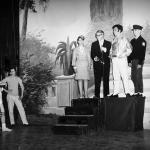
Source: Flickr user Ted Eytan
License
As a kid, I spent countless hours drawing up maps of imaginary civil wars, feuding statelets marked by jagged lines on printer paper. I’d have these make-believe polities fight, draw arrows to signal invasions, and mentally play out cartoon versions of on-the-ground violence. When I wasn’t doing that, I’d spread playing cards across bedroom and hallway floors, shaping units and formations out of twos and tens, sorting armies by suit and value (I learned to play poker when I was about four, which is more useful than you’d think). I was no athlete, at least not more than the average suburban middle schooler. I’d always rather have been playing Guan Yu or Barbarossa than watching first base. Despite (or maybe because of) my thin frame and moderate (at best) sense of coordination, I wanted to be a warrior.
I don’t think I was alone in incarnating the dual poles of scrawniness and would-be soldiering. Just a hunch. In my view, it’s this common (if ineffectual) combination that accounts for the cult status of Paul Verhoeven’s Starship Troopers (1997), a loose adaptation of Robert Heinlein’s 1959 sci-fi novel of the same name. The movie version follows Johnny Rico (Caspar Van Dien) and a couple of his high school classmates as they navigate military service in a fascist future. Only this is no dystopia. The people are gorgeous; the trains and spaceships run on time. Service guarantees citizenship. There are even psychics, the Jolly Wests of fascist utopia, who can use their advanced mind science to understand the human race’s new foe—the bugs, a race of intelligent insectoids who live further away than the brain can grasp.
Despite failing critically and commercially upon release, Starship Troopers is now much lauded as a satire. Paul Verhoeven directed it after all. It’s hilarious. You’ll get no disagreement from me. The melodramatic acting undermines the otherwise utopian self-seriousness, as when Carmen (Denise Richards) writhes in pain from a wound only to sound like the direction was “moan softly and sensually but really hard and dramatically at the same time.” Humanity’s vast overestimation of its own abilities, the speed with which it resorts to violence—the dialogue captures these unconscious foibles perfectly. After an asteroid (supposedly fired by the bugs) destroys his home city of Buenos Aires, Rico interrupts a reporter, already working hard at mocking peaceniks, to sneer “I’m from Buenos Aires, and I say kill ‘em all!” When he and his comrades get matching tattoos, they guzzle whiskey, flex, and grunt like professional wrestlers in the locker room.
But cinema is not just an intellectual exercise. And what I found on this re-watch was the impressiveness of its hokey story. Verhoeven meant to take down Heinlein. He does. Nothing that could be expressed without cliché (so, everything) is allowed to be so. The romances are stilted; characters motivations make the kind of sense you can only capture with a head scratch and a four-word sentence like “he loves the girl” or “she is not sure.” Yet I found myself totally engrossed in large part because of how Verhoeven shoots the film. His characters remain utterly serious. Handheld cameras shake as smoke spews from fissures in spaceship hulls. The characters may be one-dimensional (even non-dimensional) but the film never stops pretending they aren’t.
As a result, the battle scenes are exciting. I found myself gasping when bugs jumped from nowhere to impale unhappy grunts. I screeched when the mobile infantry fell for the Arachnids trap and insectoids swarmed in their hundreds to devour a couple dozen soldiers. The aliens do feel terrifying, viscerally so with their inhuman eyes and numerous legs, their scuttering across inhospitable terrain. I felt this discomfort even though I knew that the humans were the bad guys, the colonists and invaders provoking the conflict to begin with. For a little while, I was back drawing those maps and arranging those cards.
I don’t think that undermines Verhoeven’s point, which is obviously to attack and satirize a society so infatuated with power, authority, and violence that it picks fights to sustain itself. In fact, that he imbues clichés with energy and interest forced me to pause and ponder. How seductive is violence? How seductive is power? And most of all: how can I get my hands on a nuke RPG?













